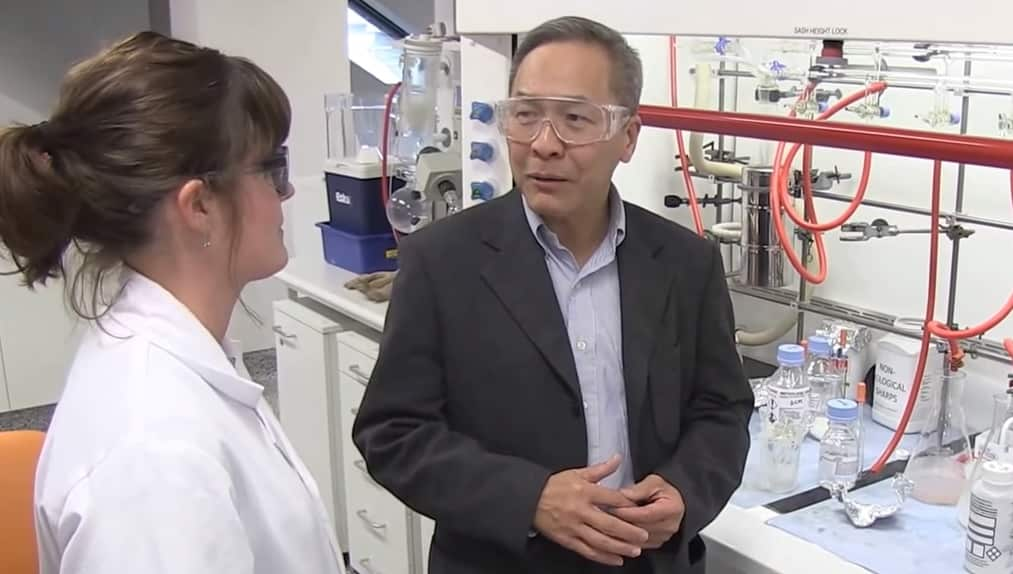In 1979, a 25-year-old San Thang spent four days and three nights aboard a cramped fishing boat with hundreds of other asylum seekers after fleeing persecution in Vietnam.
On the third night, Thai pirates rammed the wooden vessel and boarded with guns, and began demanding valuables from the passengers.
After a treacherous night bailing the water that was gathering below deck where the hull had been damaged by the pirates, the boat finally reached a small island in Malaysia.
The 409 passengers were then transferred to a refugee camp on Bidong Island. Four decades on, Professor Thang tells SBS Mandarin that it was the “best decision he ever made” to come to Australia – a decision he had to make within seconds.
As he had been voluntarily assisting with the works of interpreting and registering other refugees during his five-month stay at the camp, he recalls that an immigration officer from Australia asked him: “San, you have ten seconds to tell me if you want to come to Australia.” Without further thinking, Prof Thang immediately seized on the opportunity and arrived in Brisbane on October 17, 1979.
Without further thinking, Prof Thang immediately seized on the opportunity and arrived in Brisbane on October 17, 1979.

South Vietnamese troops and western TV newsmen run for cover as North Vietnamese mortar round explodes on Newport Bridges on Saigon outskirts in Saigon in 1975. Source: AAP
Prof Thang, whose parents immigrated from China during the 1930s, was brought up in Vietnam, where he spent his youth adapting to life inside a country torn apart by war and ideological division. Feeling the malice of a society which frowned upon his community following the Vietnam War, he lost hope for a future in his home country and decided to flee.
He boarded the 19 x 3.5m boat, after paying for his spot with a 250-gram gold nugget that his brother had given him for the journey.
It didn’t take him long to realise that he’d made the right decision to move to Australia, who had abandoned the White Australia Policy six years earlier and opened its arms to refugees.
Following a short stint as a labour worker, he was able to continue to chase his dream of becoming a scientist – following on from his completion of a Bachelor of Science at Saigon University in 1976. In 1980, Prof Thang was hired as the research assistant to the Vice Chancellor of Griffith University, which presented him the opportunity to complete his Honours degree in chemistry and a PhD in organic chemistry.
In 1980, Prof Thang was hired as the research assistant to the Vice Chancellor of Griffith University, which presented him the opportunity to complete his Honours degree in chemistry and a PhD in organic chemistry.

San Thang at the Australian Academy of Science. Source: Australian Academy of Science
In 1986, he joined the CSIRO, the federal government’s scientific agency.
He tells SBS Mandarin that it feels as if “there’s someone who has been leading me, arranging for my life in the background.”
In 2014, research by Thomson Reuters for their citation laureate prize named Prof Thang, who was 60 years old at the time, as one of a trio of scientists from the CSIRO, including Ezio Rizzardo and Graeme Moad, as likely to be contenders for the Nobel Prize in Chemistry.
The three scientists co-developed the reversible addition−fragmentation chain-transfer polymerization (RAFT) process.
The research in RAFT technology was considered the most advanced in the field.
However, one month after the announcement, he was notified that his employment at the CSIRO was to be terminated, as part of mass job cuts at the organisation.
Mr Thang says he was at peace with the decision after only a day.
“In your life, there are good times, and there are bad times. Everyone should know how to let it go,” he says.
“We need to look forward, to have a goal for our lives. With my research, I feel like every day in my life is new and unique, thus I can let go of other things.”
The news of his sacking, as he was a Nobel contender, gained widespread media attention, but Prof Thang insists it was not a big deal.
“I didn’t want to rock the boat, as CSIRO has been very kind to me,” he says, adding “I can only be myself today thanks to what CSIRO has offered me”.
After his job with the CSIRO, Prof Thang accepted an offer from Monash University as a professor of chemistry.
He is now an Honorary Fellow doing volunteer work with the CSIRO.
Among the awards throughout his illustrious career was being elected a Fellow of the Australian Academy of Science in 2015. In June 2018, Prof Thang was awarded the Companion of the Order of Australia for his “eminent service to science, and to higher education, particularly in the fields of polymer chemistry and materials science, through seminal contributions as a research innovator, as a mentor, and to the community”.
In June 2018, Prof Thang was awarded the Companion of the Order of Australia for his “eminent service to science, and to higher education, particularly in the fields of polymer chemistry and materials science, through seminal contributions as a research innovator, as a mentor, and to the community”.

Professor San Thang Source: credit by San Thang
As a Christian, he lives a humble life and is often seen washing dishes in the kitchen in his church. When asked about his opinion on science and religion, he says: “I’m not inventing anything; I’m just re-discovering them.”
Above all, he has always considered himself “extremely lucky”, although, in fact, his own hard work undoubtedly contributed to his “lucky future”.

